Class 10 ICSE Physics Specimen 2025
Maximum Marks: 80
Time allowed: Two hours
Answers to this Paper must be written on the paper provided separately.
You will not be allowed to write during first 15 minutes.
This time is to be spent in reading the question paper.
The time given at the head of this Paper is the time allowed for writing the answers.
Section A is compulsory.
Attempt any four questions from Section B.
The intended marks for questions or parts of questions are given in brackets [ ].
Section-A
(Attempt all questions from this Section.)
Question 1
Choose one correct answer to the questions from the given options:
(i) A moment of couple has a tendency to rotate the body in an anticlockwise direction. Then the moment of couple is taken as:
(a) positive
(b) negative
(c) maximum
(d) zero
(ii) The kinetic energy of a given body depends on the:
(a) position
(b) centre of gravity of the body.
(c) momentum
(d) displacement
(iii) For burning of coal in a thermoelectric station, the energy conversion taking place is:
(a) chemical to heat to mechanical
(b) chemical to heat to mechanical to electrical
(c) chemical to heat to light
(d) heat to chemical to mechanical
(iv) The adjacent diagram shows the movable block of a block and tackle system with effort in a convenient direction. From the diagram we can conclude that the number of pulleys used in the fixed block are ______
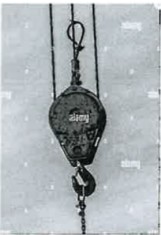
(a) 1
(b) 3
(c) 2
(d) 4
(v) White light is dispersed by a prism. Inside the prism, compared to the blue light, the red light
(a) slows down less and refracts more
(b) slows down more and refracts less
(c) slows down more and refracts more
(d) slows down less and refracts less
(vi) An endoscope uses optic fiber to transmit high resolution images of internal organs without loss of information. The principle of light that is used by the optic fiber is based on:
(a) refraction
(b) reflection
(c) scattering
(d) total internal reflection.
(vii) A convex lens has focal length 12 cm with an object at a distance of 20 cm in front of the lens. He obtains a blurred image on the screen placed at a distance of 23 cm in front of the lens. In order to obtain the clear image, he has to move the screen
(a) towards the lens
. (b) away from the lens.
(c) to a position very far away from the lens.
(d) either towards or away from the lens.
(viii) Assertion(A): Infrared radiations travel long distance through a dense fog and mist.
Reason(R): Infrared radiations undergo minimal scattering in earth's atmosphere.
(a) both A and R are true and R is the correct explanation of A.
(b) both A and R are True and R is not the correct explanation of A.
(c) assertion is false but reason is true.
(d) assertion is true but reason is false.
(ix) Two sound waves X and Y have the same amplitude and the same wave pattern but their frequencies are 60 Hz and 120 Hz respectively, then (a) X will be shriller and Y will be grave (b) X will be grave and Y will be shriller (c) X will differ in quality than Y (d) X is louder than Y.
(x) The graph of voltage vs current for four different materials is shown below.
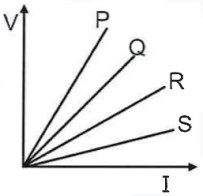
Which of these four materials would be used for making filament of a bulb?
(a) Q
(b) S
(c) P
(d) R
(xi) According to the old convention, the colour of the earth wire is:
(a) black
(b) green
(c) yellow
(d) red
(xii) Current is flowing through a coil as shown in the figure. Which one of the given figures will correctly depict the magnetic polarity and the direction of the lines of force along the axis of the coil.


(xiii) Heat capacity of a body is the:
(a) energy needed to melt a body without change in its temperature.
(b) energy needed to raise the temperature of a body by 1°C
(c) increase in volume of the body when its temperature increases by 1°C
(d) total amount of internal energy that is constant.
(xiv) The amount of heat energy required to melt a given mass of a substance at its melting point without any rise in its temperature is called as the:
(a) specific heat capacity
(b) specific latent heat of fusion
(c) latent heat of fusion
(d) specific latent heat of freezing
(xv) A nucleus of an atom consists of 146 neutrons and 95 protons. It decays after emitting an alpha particle. How many protons and neutrons are left in the nucleus after an alpha emission?
(a) protons = 93 , neutrons = 142
(b) protons = 95 , neutrons = 144
(c) protons = 93 , neutrons = 144
(d) protons = 95 , neutrons = 142
Question 2
(i) Complete the following by choosing the correct answers from the bracket:
(a) A _______ M.A. > 1.[class I/class II/Class III] lever will always have
(b) In a block and tackle system, increase in the weight of the movable ______ [decreases, does not affect, increases] the block efficiency of the pulley system.
(c) If the mass as well as the velocity of a body is doubled then the kinetic energy of the body______ [is doubled/becomes eight times/becomes four times] the initial kinetic energy.
(d) Unit of power used in mechanical engineering is _____[watt/horse power/erg per second]
(e) Two copper wires can have the different _____[resistivity/resistance] but will have same _____[resistance /resistivity]
(ii) Draw a graph of potential energy vs height for a body thrown vertically upwards. [Assume no friction is present.]
(iii) (a) Name the waves used for echo depth sounding.
(b) Give one reason for their use in the above purpose.
Question 3
(i) (a) Refer to the diagram given below. A lens with two different refractive indices is shown. If the rays are coming from a distant object, then how many images will be seen?
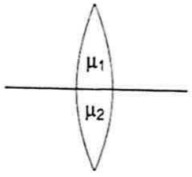
(b) A glass lens always forms a virtual, erect and diminished image of an object kept in front of it. Identify the lens.
(ii) If live wire makes an accidental contact with the metal case, which circuit (A or B) in the diagram, illustrating an electric iron, is considered safe for the user (Assuming the fuse is present in the live wire in both circuits)? Justify your answer.
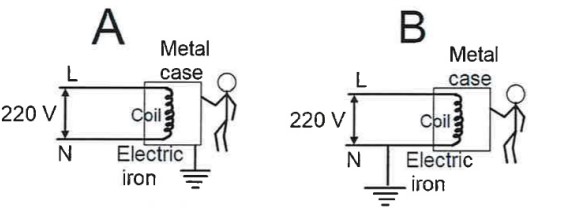
(iii) A transformer is used to change a high alternating e.m.f. to a low alternating e.m.f. of the same frequency. 2]
(a) Identify the type of transformer used for the above purpose.
(b) State whether the turns ratio of the above transformer is =1 or >1 or< l.
(iv) A solid of mass 60 g at 100°C is placed in 150 g of water at 20°C. The final steady temperature is 25°C. Calculate the heat capacity of solid. [sp. heat capacity of water=4.2Jg-1K-1 ]
(v) (a) Name the principle of AC generator.
(b) State its one use.
(vi) (a) Name the radiations that are emitted during the decay of a nucleus, which has highest penetrating power?
(b) Does the emission of the above-mentioned radiation result in a change in the mass number?
(vii) The graph (fig A) illustrates the correlation between the number of protons (x-axis) and the number of neutrons (y-axis) for elements A, B, C, D, and E in the periodic table. These elements are denoted by the letters rather than their conventional symbols. When the element C, depicted in the graph, undergoes radioactive decay, it releases radioactive rays. When these rays are directed into the plane of the paper in the presence of a magnetic field, as indicated in the fig B, they experience deflection, causing them to move upwards.
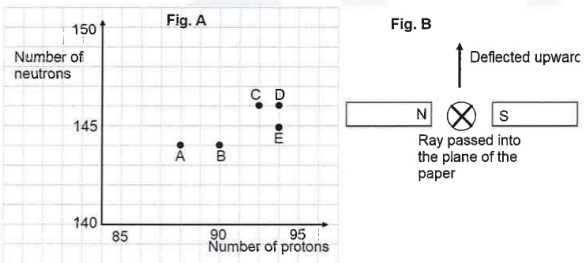
(a) Name the radioactive radiations emitted by the element C.
(b) Identify the daughter element from the graph.
(c) Name the law used to identify the radioactive radiations emitted by the element.
Section-B
(Attempt any four questions from this Section.)
Question 4
(i) The diagram below shows a fish in the tank and its image seen in the surface of water.
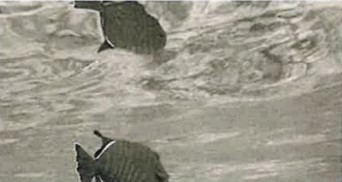
(a) Name the phenomenon responsible for the formation of this image.
(b) A double convex lens with refractive index μ1 inside two liquids of refractive indices μ2 and μ3 are shown in the diagrams below. The refractive indices are such that μ2 > μ1 and μ1 > μ3
How would a parallel incident beam of light refract when it comes out of the lens in each of the cases shown above?
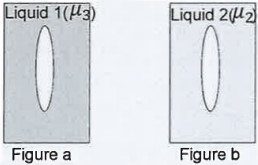
(1) in Fig a.
(2) in figure b.
(ii) The refractive index of water is 1.33 at a certain temperature. When the temperature of water is increased by 40 °C, the refractive index changes to 'x'.
(a) State whether x < 1.33 or x > 1.33.
(b) State two differences between normal reflection and total internal reflection.
(iii) (a) Mixture of red+blue+green is passed through a convex lens as shown in the diagram below. State whether the ray passes through a single point or through different points on the principal axis after refraction.
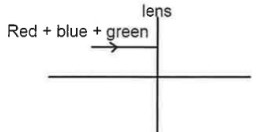
(b) Name the invisible radiations which are studied using the quartz
(c) State one use of these radiations.
(d) Name one radiation having the wavelength longer than the wavelength of these radiations.
Question 5
(i) An object is placed at a distance 24 cm in front of a convex lens of focal length 8 cm.
(a) What is the nature of the image so formed?
(b) Calculate the distance of the image from the lens.
(ii) When sunlight passes through water droplets in the atmosphere it gets dispersed into its constituent colours forming a rainbow. A similar phenomenon is observed when white light passes through a prism.
(a) Which colour will show the maximum angle of deviation and which colour will show the minimum angle of deviation?
(b) Instead of sunlight, a green-coloured ray is passed through a glass prism. What will be the colour of the emergent ray?
(iii) O is a luminescent particle trapped inside a glass block. A student traces the path of rays coming out of it and reflecting over a plane mirror as shown in the diagram below.
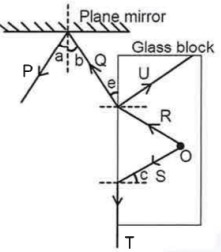
Complete the table, using the labels from the figure. The first label is done for you.
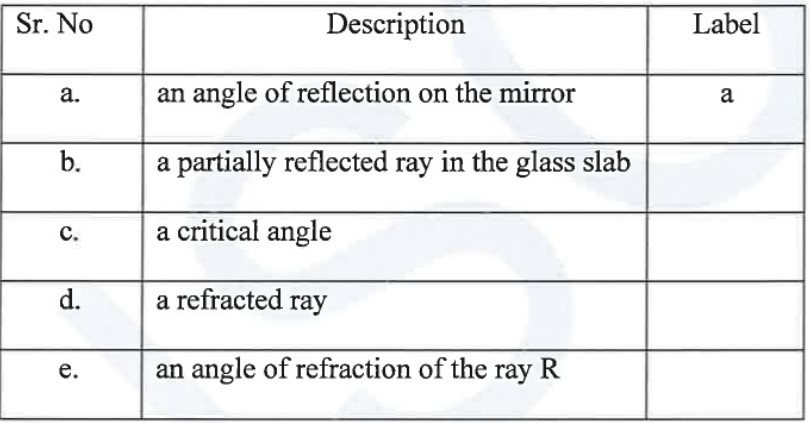
Question 6
(i) A metal rod AB of length 80 cm is balanced at 45 cm from the end A with 100 gf weights suspended from the two ends.
(a) If this rod is cut at the centre C, then compare the weight of AC to the weight of BC. (b) Give a reason for your answer in (a)

(ii) For each of the following scenarios, state whether the work done by gravity is positive, negative, or zero.
(a) a person walks on a levelled road.
(b) a person climbs a ladder.
(c) a car in neutral gear is coming down the slope.
(iii) The figure below shows a simple pendulum of mass 200 g. It is displaced from the mean position A to the extreme position B. The potential energy at the position A is zero. At the position B the pendulum bob is raised by 5 m.
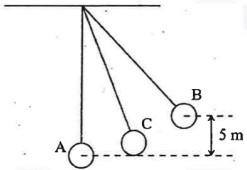
(a) What is the potential energy of the pendulum at the position B?
(b) What is the total mechanical energy at point C?
(c) What is the speed of the bob at the position A when released from B?
(Take g = 10 ms2 and given that there is no loss of energy.)
Question 7
(i) A block and tackle system of pulleys has velocity ratio 4.
(a) Draw a labelled diagram of the system indicating clearly, the direction of the load and effort.
(b) Calculate the potential energy of the load 100 kef lifted by this pulley to a height 5 m. (g = 10 ms2)
(ii) A person standing in front of a cliff fires a gun and hears its echo after 3s. If the speed of sound in air is 336 ms-1
(a) Calculate the distance of the person from the cliff.
(b) After moving a certain distance from the cliff, he fires the gun again and this time the echo is heard 1.5 s later than the first. Calculate the distance that the person moved.
(iii)
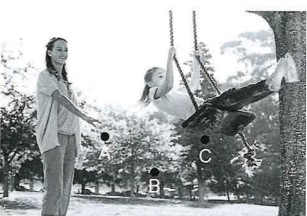
The above picture shows a mother pushing her daughter sitting on a swing. The swing is going through the positions A, B, C where A and C are extreme positions and B is the mean position.
(a) Which is the right position i.e. at A, B or C, for the mother to give a constant periodic push to the swing every time in the forward direction to increase the amplitude of the swing?
(b) Name the phenomenon involved in this.
(c) Explain with this example how this phenomenon helps to increase the amplitude of the swing.
Question 8
(i) The circuit depicted in the figure is employed for studying Ohm's Law. Instead of using a standard resistor, a student opts for a glass tube filled with mercury (tube 1), connected to the circuit through two electrodes E1 & E2. He records the readings of the ammeter and voltmeter, thereby calculates the resistance. The student repeats the experiment by substituting tube I with tube 2, where the same amount of mercury fills the tube 2.
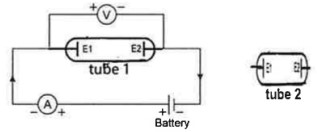
Neglecting internal resistance of the cell use (> or < or =) to compare
(a) the resistance in both the cases.
(b) the voltmeter readings in both the cases.
(c) the specific resistance in both the cases.
(ii) A radioactive nucleus X emits an alpha particle followed by two beta particles to form nucleus Y.
(a) With respect to the element X, where would you position the element Y in the periodic table?
(b) What is the general name of the elements X and Y?
(c) If the atomic number of Y is 80 then what is the atomic number of X?
(iii) Observe the given circuit diagram and answer the questions that follow:
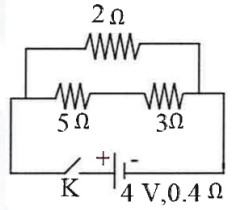
(a) Calculate the resistance of the circuit when the key K completes the circuit.
(b) Calculate the current through 3Q resistance when the circuit is complete.
Question 9
(i) What mass of ice at 0°C added to 2.1 kg water, will cool it down from 75°C to 25°C ? Given Specific heat capacity of water = 4.2 Jg-1 °C-1, Specific latent heat of ice = 336 Jg-1.
(ii) The diagram below shows a cooling curve for a substance:
(a) State the temperatures at which the substance condenses.
(b) The temperature range in which the substance is in liquid state.
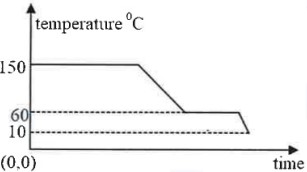
(c) Why do we prefer ice to ice-cold water for cooling a drink?
(iii) The diagram below shows a cardboard on which iron filings are kept. A wire bent in the form of a loop is seen passing through the cardboard. When current flows through it the iron filings arrange themselves as shown below with the direction of magnetic field.
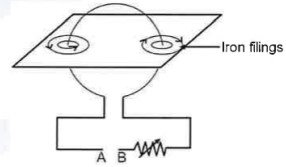
(a) State the polarities of the battery at A and B.
(b) State the effect on the magnetic field if an iron rod is held along the axis of the coil.
(c) State one way to:
1. change the polarity of the coil.
2. decrease the strength of the magnetic field around the coil.

Add a comment